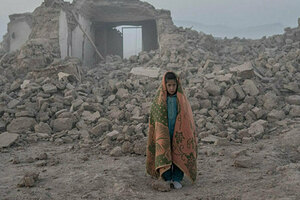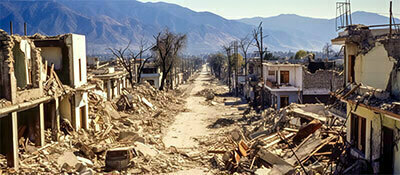
As the world tunes in to news coverage about the unfolding Israel/Palestine tragedy, Afghanistan shoulders the aftermath of a catastrophic natural disaster -- but without media fanfare.
Late in the morning of Oct. 7, the first 6.3 magnitude earthquake shook Afghanistan’s Herat region. About 30 minutes later, a second 6.3 magnitude earthquake hit. Combined, these two earthquakes killed at least 2,445 and injured countless others. More than 90% of the casualties were women and children.
In the weeks following these devastating events, Herat continues to experience aftershocks, with subsequent earthquakes ranging in magnitude from 4.7 to 6.3.
At the Kroc Institute for International Peace Studies, part of the Keough School of Global Affairs, students and alumni have banded together to help gather aid. Joining forces via a group of Notre Dame Afghanistan alumni on WhatsApp -- including Wasal Faqiryar (Ph.D. student, peace studies and anthropology), Tahmina Sobat (LL.M ‘20), and Roqia Samim (LL.M. ‘22) -- members first contacted each other to make sure those who have family and friends in the affected areas were okay. Immediately, the conversation evolved into a call to action – what could they do to help?
“It is truly heart-wrenching to witness people’s suffering from the earthquakes, people who still have not recovered from the shock of the Taliban’s resurgence in August 2021 and their continued destruction of the country and women’s rights since then,” said Sobat.
Those who survived the earthquakes have found their homes, constructed largely of mud, completely razed, unable to withstand subsequent earthquakes and aftershocks. A sandstorm caused further devastation; tents serving as refuge for those who’d lost their homes were destroyed. To date, the United Nations estimates nearly 66,000 people across six districts have been directly affected by the quakes.
“At least 11 villages have been impacted,” said Aref Dostyar (M.A. ‘16), advisor and program leader for the Kroc Institute’s Afghanistan Program for Peace and Development. “People are continuing to stay in their cars, and they have moved away from areas where aftershocks are predicted. Hospitals are overwhelmed.”

Adding to the already-dire situation, getting aid to those affected is difficult. The SWIFT system, a common way to send funds internationally between banks and other financial institutions, is unavailable. While other transfer methods such as Western Union and MoneyGram remain active, some laws, regulations and sanctions within the international community restrict nonprofits and foundations from using them due to the Taliban’s hold on the region.
“We have to use very local traditional models to be able to reach out to people,” Dostyar said. “To the extent we can, we use banks and international systems. When these systems are not responsive, we have used registered businesses and transportation companies -- like bus companies, for example -- that are able to take the resources from one city to another.”
With winter on the horizon, the need for aid -- including food, water, clothing, shelter, medicine and medical attention -- is tantamount.
Dostyar explained the initiatives the group is working on in the short-term. “We are working to get tents,” he said, the prices of which have ballooned as demand has increased. To assist with immediate needs, Dostyar points to two nonprofit groups -- Afghans for Progressive Thinking, a youth-led nonprofit organization in Afghanistan that actively addresses human rights crises, and the Afghanistan Peacebuilding Initiative (API), a new organization incorporated in the U.S. of which Dostyar is a founding member. A GoFundMe has been created by members of the Heratian Community in North America, which has already surpassed its initial goal of $10,000, the funds of which will be used to help families rebuild.
Faqiryar helped share the GoFundMe link with his Notre Dame cohort and through a Tumblr account with more than 10,000 followers. “We have seen widespread support,” he said. “We have not only received donations from my Notre Dame cohort but also reached a broader global audience thanks to the efforts of the campaign organizers.”
Yet, there is more to do.
“Besides short-term needs, there are many long-term needs to consider, especially for those who lost all of their family members,” said Samim. “Thousands of children have been orphaned. They have lost their support providers. They don’t have safe shelter and access to clean water.”
Adds Sobat, “Long-term recovery efforts should focus on rebuilding and providing sustained support to the affected communities in Herat, and specifically the two villages and districts that have been at the center of disaster.”
“The future focus of aiding the sufferers should be on building robust and resilient homes for those who lost theirs, ensuring their safety against future calamities,” said Faqiryar. “Continuous assessments of their needs are vital. Providing them with agricultural tools and equipment can be an effective strategy, as it aids in restoring their self-sufficiency, especially considering the significant impact of the disaster on women and children.”
With such multifaceted issues, it can be difficult to remain resilient.
“We don’t have the option of walking away,” echoed Dostyar. “Anybody from Afghanistan, either inside or outside, has the motivation to help regardless of how difficult it is. We don’t grow wary of helping our family members.
“Despite the challenges,” Dostyar continued, “there are innovative ways that people are using. So it’s possible. It’s difficult, but it’s still possible.”
“Talk about it,” suggested Raqia. “There are thousands who lost their lives and nobody even knows. Nobody even talks about them. They’re our families,” she said. “If people don’t have resources to contribute, at least they can talk about it. In raising the issue, they can raise awareness for the people who do have the resources to help.”
If you would like to learn more about ways to help those affected by the earthquakes in Afghanistan, contact Dostyar directly.
To donate to the GoFundMe account, click here.